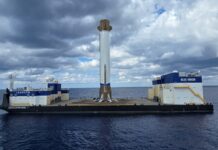Blue Origin, the space company founded by Jeff Bezos, is poised for its second launch attempt this Sunday. The towering New Glenn rocket stands ready to carry NASA’s ESCAPADE twin spacecraft on a journey to Mars, aiming to unravel mysteries about the Red Planet’s climate and pave the way for future human exploration. This mission, however, holds more significance than just delivering scientific payloads; it marks a crucial test in Blue Origin’s bid to achieve rocket booster recovery — a feat SpaceX has already mastered, solidifying its lead in the commercial space race.
Sunday’s launch window opens at 2:45 PM (1945 GMT) and spans 88 minutes. While technically possible, rescheduling due to weather or technical hiccups could be complicated by the ongoing US government shutdown and a new FAA initiative designed to alleviate airspace congestion by limiting commercial rocket launches starting Monday.
New Glenn’s inaugural flight in January was a success in placing its payload into orbit and conducting crucial tests. However, it fell short of achieving booster recovery, losing the first-stage component during descent. The upcoming mission will be another attempt to conquer this technical hurdle, with the recovered booster serving as a potent symbol of Blue Origin’s progress against SpaceX.
The stakes are high for both companies as they engage in an increasingly heated race.
NASA recently opened bids for its Artemis moon mission amidst complaints about SpaceX’s pace, highlighting the growing pressure on these private ventures to deliver tangible results. George Nield, a prominent figure in the commercial space industry and former Blue Origin passenger, describes this launch as an “indicator” of how far Blue Origin has come since its first flight.
If successful, New Glenn’s twin satellites are expected to reach Martian orbit by 2027. This ambitious timeline aligns with increased pressure from the Trump administration for NASA to expedite its lunar mission plans in a bid to compete with China’s space ambitions. While SpaceX holds the current lead, Mason Peck, former NASA chief technologist and aeronautics professor at Cornell University, sees Blue Origin’s efforts as ultimately beneficial: “More launches means more ideas in space,” he notes. “It can’t be a bad thing to have Blue Origin even trailing behind.”
The competition between these two private spacefaring giants undoubtedly drives innovation and propels humanity further into the cosmos, ensuring that the future of exploration remains excitingly uncertain.






































































